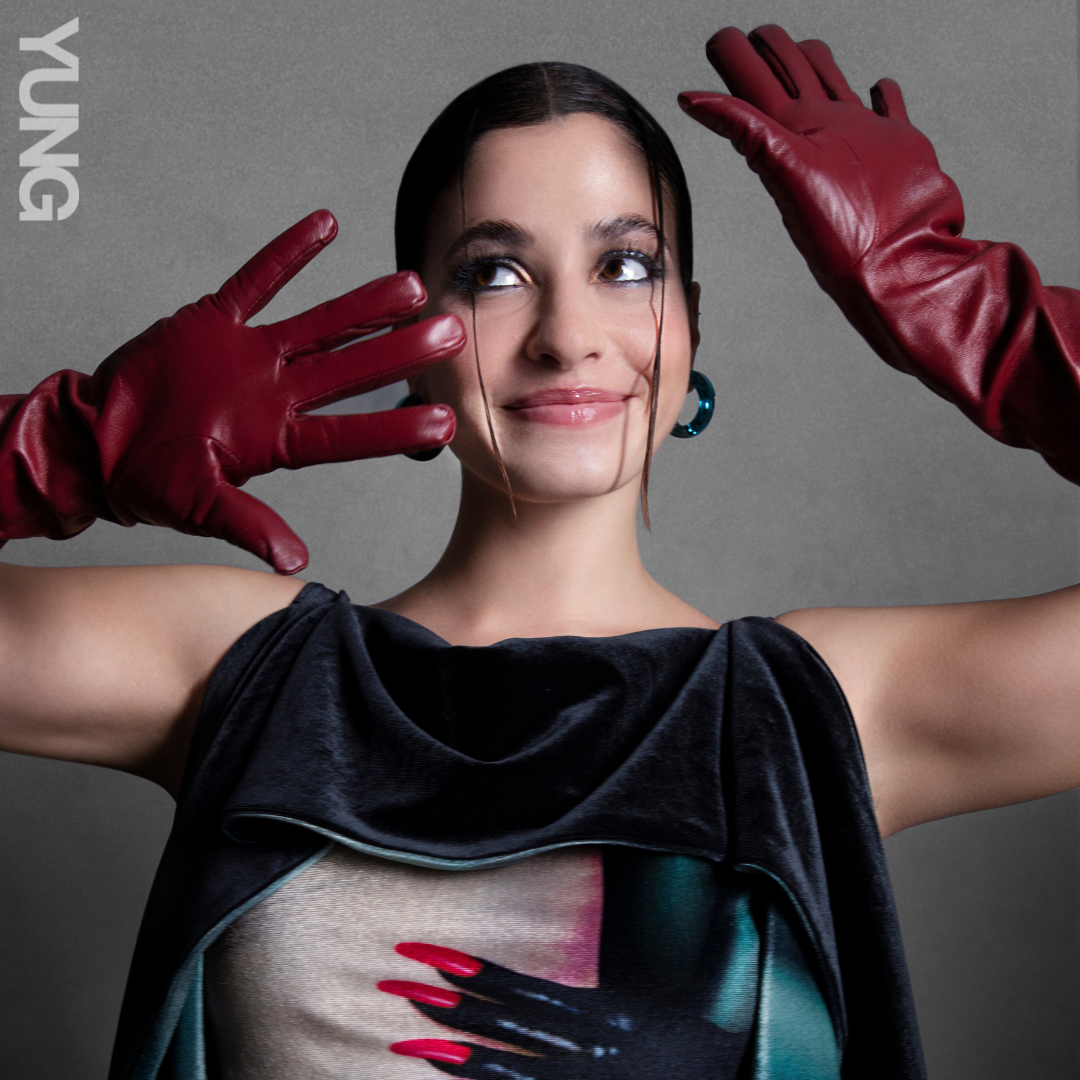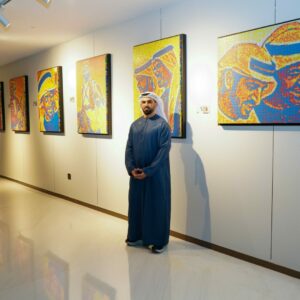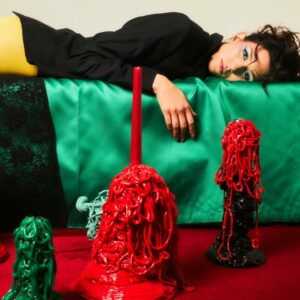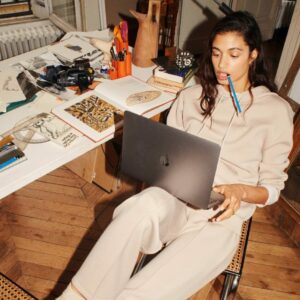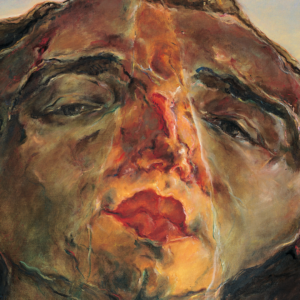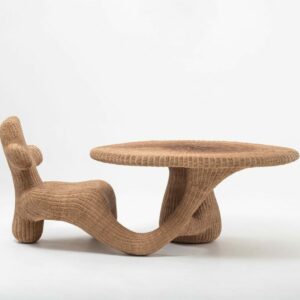Yusra Mardini is on a mission to challenge attitudes towards refugees. It’s a subject the Olympian knows only too well, escaping war-torn Syria – along with sister Sara – and even helping save lives during a treacherous boat crossing from Turkey to Greece. Right now, the first step is a Netflix premiere – her Netflix premiere. The Swimmers is the story of two sisters who escaped.
“When I was three years old, [my dad] had probably set every goal for me in my athletic life,” Mardini explains joining YUNG via Zoom from Los Angeles. She grew up amongst a family of swimmers and the sport was a generational legacy that would be passed down to her and her sister, Sara. “They expect you to become an Olympic champion,” she says laughing. “When I started, I hated it, I would always run away from it because it was cold, and I would cry.” Her earliest memory of the sport is of her dad throwing her in the pool while the Syrian national team trained, “I learned how to swim away from them and I didn’t like it. I remember hiding under my mum’s chair because I did not want to swim.”

Her father was her swimming coach in Damascus. “In the pool, I always called him coach. He would tell me, at the pool, I’m not your dad, I’m your coach and you have to respect everything I have to say. I always trusted him and I always respected him in the process. This was something that taught me a lot about life. He really was professional.” While that proved to be difficult, Mardini doesn’t deny the fact that her father was a great coach. “In the beginning I thought I was doing it for him, but slowly, I realised that I really am passionate about swimming. I’m very stubborn and I had the determination to become an Olympian.”
Swimming would consume Mardini’s teenage years. She would be picked up from school and would immediately go to training practice everyday. “I did a lot for swimming, I guess it was just preparing [me] for life and I’m thankful [my dad] was tough on me because it taught me a lot. It’s funny to me now that I think of it,” she giggles.
Driven by her passion to compete in the Olympics, Mardini’s will to live and fulfill her lifelong dream was a constant. It just seemed something preordained, that would happen no matter what the odds. Then the civil war broke out in Syria in March of 2011. It was a moment that would change the trajectory of her life.
“The first time I heard of war, I was on a school bus and one of my friends was talking about what happened in Daraa, another city in Syria. At that time I never imagined that a war would break out. We thought it was a small problem that would go away. [Later] the area I was living in started to be one of the very problematic areas, and we [ended up losing] our house.” The Mardini family would be forced to flee their hometown, moving into different apartments every few months as the war intensified. “They would cut water, electricity and the food was getting expensive.” While the place she once called home continued to collapse right before her eyes, her parents would attempt to shield the difficult news in hopes of protecting her and her sister Sara. “As an Arab, politics is a red line. We do not discuss politics and [it is very rare that we do] to protect everyone.” However, listening to the news was inevitable – it was their everyday lived experience, no matter how hard her parents tried to shield them from it.

Mardini’s life in Syria was no longer the same, in fact it was no longer safe. “At the time we didn’t have a lot of choices. It was either stay in Syria and risk my life everyday, or risk it one last time and be safe for the rest of my life.”
The film, directed by Sally El Hossaini, perfectly depicts the athlete’s life in Syria at the time. “As you can see [in the film], there was a normal life while having war, and I think many Arab countries saw that, not just Syria.” She would hear the bombings everyday – a constant reminder that her life could end at any moment. “The West [views] the Arab world as grey, where everything in it is destroyed, and I think it was important to show that even though we had war, we were trying to have a normal life as well. Unfortunately, it became normal for us to listen to the bombing and to [carry on] with our lives.” This sad reality rang true; however, she hopes the film will be able to show that Arabs are full of life and their world is colourful with so much culture and history even during conflict.
As much as she had hoped to achieve her dreams from Syria, Mardini had to make the difficult decision to leave the country with only her sister Sara by her side. As she sits behind her Zoom screen from Los Angeles, she pauses to reflect on her time there. “Syria is my first and most important home. I really miss it. I miss the food and the people. I miss just walking around there. I didn’t realise how much I loved my country until I left and that is the sad part for me. We had to risk everything to try and find a better future and have a safe place to stay.”

The sisters would eventually reach Germany, after a long and traumatic journey. In the process, she found herself on an overcrowded dinghy in the Aegean Sea. What was initially supposed to be a 45-minute trip from Turkey to Greece, took around four hours. When their dinghy’s engine failed during the dangerous crossing, and the boat started taking on water, Mardini and her sister plunged into the icy depths to help push their fellow refugees to dry land on the Greek island of Lesbos. “I would be lying if I told you if I had a clear thought. There was no clear thought. I was just in the water, I just wanted to make it to shore and it felt like I was seeing the island but was never able to reach it. It was one of the hardest things I had to do in life,” she explains, reliving the sense of despair. “It was survival mode. I saw my sister [jump in] and I thought if she can do it, I can do it too. I thought of the people on the boat who didn’t know how to swim. It was [also] scary because they knew my sister and I were swimmers and because we did our life guard license, we knew if you’re a swimmer, they might panic and might pull you down with them if anything happens.” Selfless and determined, Mardini’s main objective at the time was to make sure everyone on the boat was going to reach the shore safely. “I could have swum it. I swam in open water in Syria before, but it broke my heart that none of them knew how to swim.”
Mardini’s experience at sea is still very vivid. “I do speak about it a lot because I want people to understand that there are millions of refugees around the world and this is still happening and people are still crossing.” Her story is one in 100 million today. “I was one of the lucky ones, I’m alive and I’m still here, but there are a lot who lost their lives trying to make it to safety. I do not want to remember [it] and it’s hard to think that at just 17 years old I was forced to make such a horrific journey just to be safe and to enjoy the simplest human rights.”

After finally arriving in Germany, 25 days after leaving Syria, Mardini would contact the local swimming club near the refugee centre where she was temporarily residing at the time. The coach, Sven Spannenkrebs, not only agreed to let them train, but managed to get Yusra on to the newly formed refugee team for the 2016 Rio Olympics. Just a year after that near-deadly boat trip, Yusra was in Rio, the flag bearer for the IOC Refugee Olympic Team and her story made headlines around the world.
Unsurprisingly, Mardini’s journey has come at a cost – namely her mental health. “I’ve sought help. I didn’t immediately have any, but over the years my sister literally forced me to. She started going to therapy and the therapist was someone my she trusted a lot. I did it for a while and it helped me a lot. It’s a safe space where you can talk about everything.” Today, Mardini has come to accept and understand why she was forced to go through this experience. “Even if it’s confusing and unfair, I really believe that I am lucky and that I did achieve my dream – and that’s incredible. I went to two Olympic Games and I’m in a position where I am able to help people.”
The film also reflects something accurate about Mardini’s relationship with her sister. “My mum raised us as twins. We would wear the same clothes and I think many are like us. We would do everything together. My friends were also her friends. But we are also very different. She was the rebellious and wild one that never listened and I would always try to do everything perfectly, not to make my dad angry. I learnt a lot from her. I actually learned English because of her. I wanted to copy her and be better than her, the competitive side always got the best of me,” she bursts out laughing. “We have a special bond and I think that’s what helped us on the journey, because we understood each other and we knew no matter how different we were, in the end we would literally do anything to help each other.”

These days, Mardini is as bulletproof as ever. Sia’s song “Titanium,” takes centre stage in the film and it’s a beautiful metaphor that rings true to her experience. “I’m Bulletproof, nothing to lose, fire away, fire away,” she sings on call. “We dodged a lot of bullets, we lived in Syria and our house was destroyed, I lost a lot of friends and a lot of people around me. So many things have happened but here we are, we’re still trying, still alive and we’re lucky to be alive.”
While Mardini did just get her German passport, she believes that she will always be a refugee because of what happened to her and who she represents. “I will always represent refugees around the world and I want to encourage them to get to the level that I got to and to be able to say that I am a refugee and I’m proud of it — this is a part of me, I didn’t choose to go through this journey, but I went through it in the best way I can. It took me a while to understand and be okay with that word because again in the Arab world, you’re taught that being a refugee is not a good thing, and that’s the same around the world too.”
By understanding the responsibility she carries representing millions of people just like her around the world, today, Mardini is just as driven as ever — but she has new found goals to achieve. “I have a strong voice to change something better for the world.” Beyond her swimming, Mardini’s plans for the future include continuing her role as a UNHCR Goodwill Ambassador and launching her own foundation in the U.S. and in Germany, which will focus on sports and education. She just moved to Los Angeles to study film and TV. production at the University of Southern California. As for her swimming career, she will take a short break to decide whether she wants to continue, but as it currently stands, swimming competitively is not on the horizon. Despite being thrust into the Hollywood spotlight, she has not lost sight of her calling, and if her life story is anything to go by, the world really is her oyster.
The Swimmers is available to stream on Netflix
